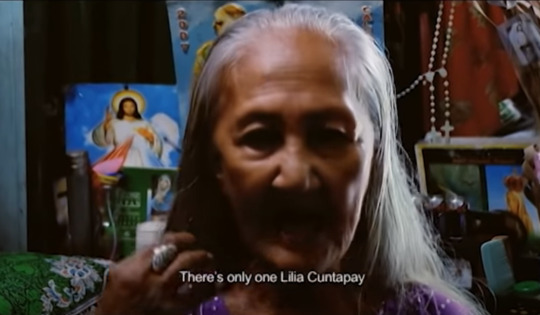Text
Ang Nagpapabulag sa Nagpapasilaw
A Maynila sa mga Kuko ng Liwanag Analysis

Jobs and occupations are tough to acquire, especially in the Philippines years before. People will go through thick and thin just to earn money or make a living. The Philippines may be advertised to the world for its national beauty and landmarks, but what people fail to see is the struggles daily Filipinos face, especially people who live in poverty, people who struggle to find a well payed job, people who struggle handling the family and household, and people who are victims and witnesses of crimes and wrong doings. Maynila sa mga Kuko ng Liwanag, a 1975 drama Film, is considered as one of the most iconic and most prevalent film of the Philippines. Staring Bembol Roco who played as Julio Madiaga, played one of the most memorable roles he played as an actor. Showing the hardships of a Julio, the protagonist, and his way of living, earnings, and “relationship”. The film sheds light to not the beauty of Maynila but the evil that lurks within it and its people.
The film is coherent, original and realistic in nature. It was filmed in various places in Maynila, and depicted the atmosphere and authenticity of Maynila. It also showed how tough it can be living in a very urbanized city especially if you’re not used to it such as Julio when he was working as a construction worker. The moral aspect of the film is strongly not for the underaged, it’s a film that phenomenally showed the sexual side of Maynila and its people. The sexual elements in the film were not romanticized, the sexual elements were not present to woo the audience, but to show how vast it is and how much people desire it most especially in times where you need money. Julio engages with escorts with the intention of getting money, and besides that, the film also covers prostitution (Ligaya and Ah-Tek) and how devious acts like this can still exist in our country. And it shows the complexity of urban cities and the film itself. There are literal people who engage in sexual activity for money because they had no other means of earning, how people can be (easily) tricked in prostitution, how gloomy it can be to work especially as a construction worker, and how family and closed loved ones can be greatly affected with your deeds – all captured into a beautiful 2 hour long film.

The referential meaning of the film has some underlying symbolism. Julio’s last name is Madiaga, a play on the word “Matiyaga” which means hardworking. Ligaya, Julio’s childhood sweetheart, means joy. Ligaya is literally the ligaya is Julio’s life, Ligaya gives Julio the joy and happiness he desires, he sees her as the paradise or his paradise of joy, which is why his heart strongly beats for her. Ah-Tek is a play on “kita”, money. Ah-Tek is a reference to how greedy a person can be and all he cares for is what s/he earns most especially money. And lastly Mrs. Cruz, the one who tricked Ligaya to Maynila for prostitution, is a reference to cruz or cross, meant to represent the “burden” she carries. Cruz can also be an alias, because Cruz is a common Filipino surname, which could explain why she gets away with things and/or not being suspected as a suspicious person. It overall shows the hard work (Julio) we have for our joy in life (Ligaya), and we have to be determined and patient in order to get what we love, even if our burden, sins (Mrs. Cruz) and greediness (Ah-Tek) makes us lose our way towards joy.

The symptomatic meaning is how society comprises a lot of variety in terms of financial recovery, job listings, family struggles, economic decay, and sexual favors, can be hidden in even the central cities of our nation. Our entire world spins if money continues to spin, it is because money is so powerful it can define an entire future. 1 peso today is not much compared to the time of the film, around the 70’s, where 1 peso is worth more than it is. And when people struggle to earn money especially if their job blows, it’s tough to find other ways to getting money that often engaging in sexual favors in exchange for money becomes a legitimate option. People would dare to leave their families and their hometown in hopes of getting better job opportunities. And there are also times where family cannot help you. When Ligaya was held captive by Ah-Tek, she couldn’t even tell her family about her situation especially if her life’s on the line.

It was such a blast watching this film. This film is actually listed in the “1001 movies you must see before you die”, Maynila sa mga kuko ng Liwanag is one of the, if not, the only Filipino film/s present in the list, and it shows. An old classic film cleverly captivates the viewer with it’s story, themes, and social constructs. The implicit meaning for how I interpreted the film is how there’s always a bright side and a dark side in life, and more often than not, the dark side is bigger. Both Julio and Ligaya left home in hopes of getting better jobs, they looked at the bright side where there is more to look forward to in a big city. But only to end up as a construction worker, and held for prostitution, doesn’t seem that much of a bright opportunity. Maynila, as told by a number of characters, is “mahirap”. It is never easy to live in such a city. Sometimes there is also light in the darkness, and darkness in the light as well. Prostitution and escorts are not a pretty “occupation” but at the very least you can technically earn from doing so, which is what both Julio and Ligaya have had in mind, when there’s no other way to go. Again knowing that there’s always darkness in light, Julio and Ligaya plans to escape and go back home, with a plan already in stored what’s the worst that could happen? Apparently, a life’s cost, Ligaya lost her life in attempts of trying to go back with Julio and leaving with her kids. And with Julio’s despair, he plots to kill Ah-Tek, thinking it could bring his emotional peace but only to end up being beaten up himself by a crowd of people. There are times where our deeds often lead to a bright thing but we take for granted the dark side of it, and often times, we have to settle to the darker or more devious choices because it’s our last and only choices.

The explicit meaning is how in the real world, it will not always be pretty, and evil can lurk in any crook, especially in ourselves. In the film, Julio was so retaliated and shocked how he instinctively fought purse snatcher and almost gotten to fight with another man, knowing he will actually end up being a bad guy himself by killing the person who kept Ligaya and (allegedly) killed her. We could take our actions and choices for granted, not knowing where it could lead us. And other thing to add, is how much we can get and lose things in life. Julio has lost so many things in his life, his family when he left, his money, his job, his friends, and Ligaya. While we still have these things with us, let us make the most out of them, and not take the wrong turn that can make us lose all of them one-by-one.
Maynila sa mga kuko ng Liwanag is one of the most profound Philippine films and a definite must-see. Beauty can have its flaws, and beauty can have its ugliness. Maynila is a beautiful city even before, but it’s not always the case because if you take a closer look, and experience the place, you can see how every nook can have its darkness. The film gravely captured how in the real world, how it ugly it can be and how evil can lurk in what’s bright – Maynila in the claws of the light.
Written by Keith Daniel Nicodemus
#Maynila#Maynila sa mga Kuko ng Liwanag#Maynila in the Claws of Light#FILMLANG#MM22#itsKeithDanNic#Philippines#Film#Analysis
2 notes
·
View notes
Text
Empress to Success
A Six Degrees of Separation from Lilia Cuntapay Analysis

Six Degrees of Separation from Lilia Cuntapay was a phenomenal mockumentary that sheds light in the Philippine Film Industry and the actors/actress with the likes of Lilia Cuntapay. The life of an actress is complex to the point that fame, awards, set roles, and lifestyle becomes either filled with glee or anticipation. Lilia Cuntapay, the star of the documentary, was longing to be awarded – as Best Supporting Actress – and she has been in the filming industry for about 30 years without winning an award, that her anticipation and anxiety, grows more and more. Finding out one day she was nominated for Best Supporting Actress, but losing to Rio Locsin. The desire of winning was in her eyes but it instantly faded as she found out she didn’t won, and this documentary shows her perspective and why winning this award is such an anticipated moment for her.

The documentary’s referential meaning is about the Philippine Film Industry, how often times actors and stresses don’t get the treatment and recognition they deserve and been longing for and Often times discriminated or told they want other people for roles or categories to win. In the documentary, Lilia Cuntapay, an actress who has been in multiple movies for years, was informed to be on set 6AM the day, without receiving any other information such as role, script, or even what the movie is about. And when the director finally met Lilia Cuntapay, he went off saying if they can get another person to fill her role since she’s old and did horror related tasks. And through-out the years, Lilia’s work has been iconic, yet she hasn’t won an award yet even though she centers the “Hollywood” of Philippines, labelled as the “Kevin Bacon” of the Philippines.
The documentary was complex in terms of its originality, because it shows Lilia’s thoughts on wanting to win Best Supporting Actress, and it is Realistic, Coherent, and Original in a sense that this is the life and the experiences a (veteran) actress goes through. She hopes for the better but sometimes it just doesn’t show up, but it will in the end. The documentary explicitly means that when you work hard on something, it will not be easy or as smooth as you thought it would be, but you will get your vocation and your worth in the end. She never won an award, but when Rio Locsin – Best Supporting Actress winner – shared her label and award to Lilia Cuntapay. And working in the film industry for years and not earning an award is tough in the eyes of an artist because even though awards aren’t everything, it gives a strong sense of value and “acceptance” to the awardee, and this documentary is Lilia’s award. She won best actress in this documentary, awards that she never got the opportunity to acquire. It will come by in the end. Even if you feel like hope is lost that doesn’t mean it’s no longer worth fighting for. And it is moral because despite of the satire and laughable elements, we can learn how a veteran actress is passionate and caring for her recognition and with the people that helped her on her journey.
When I watched this documentary I was laughing, I was thrilled, I was down, and I was proud – for Lilia Cuntapay. What made this film so original is the internal monologues and thoughts Lilia has on giving her thank you speech if she wins. This was shown in cuts where she wears a dress, surround by references to her past films, and struggling to talk in the podium.

The entire documentary itself is just an internal thought of Lilia about desiring to win an award – in my own interpretation. Through-out the film she was trying to construct her speech, and shown in parts where she visualizes herself giving the speech. And at the day of the awarding ceremony, she rehearses her speech only to find out she lost, and basically gave up on her speech, and was literally lost on what to say when Rio Locsin invited her on stage with her award. This whole documentary was a visualization of what Lilia’s desires for when winning, she tries hard to get interviews, recognition, be nominated, and she did it, she did it because of this documentary. She may not have won in her past roles, but for her role in this documentary - a documentary showing her desire to win - made her an award-winning actress.
Director Peque Gallaga expressed his love and amazement about Lilia Cuntapay and how much she is one of the amazing Filipino actresses there is. He also mentioned how much an award is worth it to an actor/actress. The documentary symptomatically means how just in real life awards should actually mean anything, but the psychological and emotional attachment it has is very strong, and society always look upon any person with an award in glory. Just the label “award winning actress” shows great value to the actress and looked up on society. The psychology behind awards is that give the awardee that entitlement that they did amazing, they are worth it, they deserve this from all their hard work, everyone will see how amazing of a person you are. It literally just a label, paired with a piece of material like a trophy, medal, certificate etc. But the power it has is strong. In the real world, the label you have will make you stand out and looked up on the most, even in Politics. A person who has categories such as award winning actress, best production, charity head, etc. has a way bigger reputation and earns more opportunities, compared to someone who is just an actress for years or has years of experience in acting. The entitlement means a lot to an individual as well as awards, and it’s normal to a person to desire for that, especially to an actress who was 75 years old and working in film for many years.

Winning isn’t everything, but it sure is something. Lilia Cuntapay hasn’t won an award until this documentary was released. She labels herself as an actress, but not famous. She may have worked in many films but wouldn’t consider herself well known, even if she is metaphorically the “Kevin Bacon” of Philippines for that she worked with many people in the industry. Many people were not even familiar with her, until one roles and works were mentioned to retain the people’s memory. Some people remember her, some people don’t, but what stays the same is how much of a successful actress and individual (in general) Lilia Cuntapay is. In the end, even if you did not get the recognition you always wanted, that doesn’t mean you will never be successful.
Written by Keith Daniel Nicodemus
#Lilia Cuntapay#Six Degress of Separation from Lilia Cuntapay#FILMLANG#MM22#itsKeithDanNic#Documentary#Philippines#Film#Analysis
0 notes